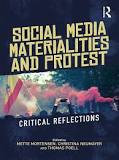 “Far from being neutral, social media platforms – such as Facebook, Twitter, YouTube, and WeChat – possess their own material characteristics, which shape how people engage, protest, resist, and struggle.” This is the incipit of Social Media Materialities and Protest: Critical Reflections, a new book edited by Mette Mortensen, Christina Neumayer and Thomas Poell on how the tension between social media’s techno-commercial infrastructures and activist agency plays out in protest.
“Far from being neutral, social media platforms – such as Facebook, Twitter, YouTube, and WeChat – possess their own material characteristics, which shape how people engage, protest, resist, and struggle.” This is the incipit of Social Media Materialities and Protest: Critical Reflections, a new book edited by Mette Mortensen, Christina Neumayer and Thomas Poell on how the tension between social media’s techno-commercial infrastructures and activist agency plays out in protest.
In this book, published by Routledge, Coretti (who co-authored the chapter with Daniele Pica) argues that the commercially-driven design of Facebook promotes ‘cycles of depression’ in those movements that adopt social media as means for mobilization and circulation of information.
“By reinforcing hierarchical stratification and reshaping organizational processes, Facebook pages undermine collective identity, accelerating or even bringing into being oligarchization, fragmentation, and schismogenesis. Paradoxically, whereas mobilization processes are sped up by algorithmic distribution of information, the search for a cohesive collective and organizational identity is slowed down. Hence, the cycle of depression is not merely an outcome but also a fundamental condition of misalignment between organization, collective identity, and mobilization.”
Here is the abstract of the chapter.
The book is available for purchase via Amazon and the publisher’s website.
